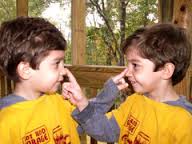If someone won’t meet your gaze, it’s assumed that they might be lying to you, or being deceptive and trying to hide something. Calling a person “shifty-eyed” implies a devious character. On the other hand, the person who won’t look you in the eye could be extremely shy, bordering on afraid. This was the case with me years ago when I wore thick glasses and was highly near-sighted. I did not want to look at anyone because it seemed like they could see right through my eyes into my private thoughts, making me feel vulnerable and exposed.

When I started vision improvement, it was a brand-new adventure, and I wasn’t sure what to expect, or if I could dare hope to actually help myself see more clearly. Would this work, or was I doomed to wear my thick -10 lenses forever? As I examined my habits and way of being in the world, it struck me that I hardly ever looked anyone in the eye. When I went for a walk I looked at my feet, not ahead and out at the world. If anyone approached me, I tended to glance to the side of them or beyond them. I was clearly not using my eyes to connect!
For most of us, our vision is the dominant sensory modality with which we interpret our environment. “Did you see that?” we ask a friend, meaning “Did you perceive what I did, and understand it the same way?”. When I studied with Peter Grunwald, the developer of the Eyebody Method of vision improvement, he told us to look all the way out to a distant object, even if it appeared blurry at first. If we were in the habit of stopping our gaze a few feet ahead of the object, not making full eye contact, we wouldn’t ever see it clearly.
Years ago I was very shy, so it was easier for me to practice looking fully at a tree than at a person. I felt my energy go out from my visual system, and imagined I felt the tree receiving it, then sending it back with gratitude. How many people take trees, the lungs of our precious planet, for granted? In all seasons, bare-branched in winter, or fully leafed in warmer weather, there’s plenty to see, clearer and clearer. But I had to look to see!

Now when I go for a walk I enjoy looking out at the scenery around me, left and right and overhead and far down the sidewalk in the distance. I practice engaging visually with the people I see, which is still not automatic for me, as I tend to be more introverted than extroverted. Most people who look at me are not inspecting me for flaws or about to interrogate me, which is how it used to feel, they’re just interested in me!
All those years behind thick strong lenses kept me separate, apart from the world and others. If I choose to be alone I still can be. However if I choose to be out in the stream of Life, I want to really be in it, not “phoning it in”, doing it half-way. Do those you love a favor today: really see them. Another bad habit I used to have was to see what I expected, a remembered or imagined image in my head, instead of seeing what was right in front of my eyes in the moment. What a gift to be seen and received just as we are! Are you making eye contact?
get help on our Facebook Group!

I wore strong glasses, then contact lenses, from age 5 into my 40s. While making many mistakes, eventually l learned how to improve the way I use my eyes and to see in a more relaxed, healthy manner. It is my pleasure to coach others to do the same. Visit me at https://NancyLNeff.com.

Dale, thanks so much for your thoughts, and good for you for your awareness! I do think those first minus lenses, or a new pair of stronger ones, often cause folks to back away visually from that stark too-clear view, which can feel like an invasion. I’d encourage you to reach out and make eye contact gently (not forcefully), as you feel ready. Most of us have been pushed too much, and have pushed ourselves too much. Let it be easy, and fun! Thanks for writing. 🙂
Very interesting article.
I wore plus glasses for many years on and off, but several years ago adult onset myopia required me to wear a -.75 correction full time. I became very aware of my surroundings because of the high definition effect of my new glasses. I noticed that I was shying away from eye contact, but didn’t think much of it. Then a few months ago my nearsightedness became 20/200, and my prescription quickly went to -2.25. At this time I became very reluctant to make eye contact. It was as though everyone would notice that my glasses are now so much stronger, and avoiding eye contact no one would notice them. My glasses are actually an under correction, so in the future they will be stronger.
I thought back to a girl that I had dated who was very nearsighted, and even with her thick lenses could not see 20/20. Her lenses had a dished out effect on the front surfaces, and her eyes appeared very tiny behind them. She was the first person that I had met that could not make eye contact. One day the subject came up, and she said that by looking someone in the eye, that she felt like they could look through those strong glasses, and know how poor her eyesight was. It seemed silly to me at the time, but now I understand.
After reading this article I will work on eye contact, and try to not be self conscious about my lenses.
Hi Nancy,
Awesome article about Eye contact. Thanks for share
Thanks, Miska!
The topic of “Eye Contact” immediately triggered a myriad of memories, associations etc., so that I initially refrained from commenting because nothing felt very coherent. Only this: Ever since I remember, direct eye contact (through glasses/contacts – I don’t remember ‘eye contact’ before that time) felt like a sudden, strong physical (electrical?) shock to me, accompanied by varying messages of “DON’T!”. This still happens, but these days, mostly, I can follow the process and the various messages, and I am becoming clearer as to where these messages originated.
Without glasses/contacts, there is no shock (because I can’t see faces clearly); this speaks volumes to me of what my eyes wanted to avoid ‘back then’ but were forced to do anyway by putting lenses on them.
Roman, yes, me too. My practice now is knowing that I don’t have to look if I don’t feel comfortable about it, not forcing my eyes to look and not see, which gives a very confusing message to my visual brain. And also convincing myself on a regular basis that I AM safe, and can’t be invaded by someone just looking at me, like a child can be. Keep up the good work!
Hello Nancy!
As regards eye contact I have read that it can vary from culture to culture. So Westerners generally make much more eye contact with each other than occurs in East Asia. This can lead to misunderstanding, as people from the West can be perceived by them as over-confident, cocksure etc. I think it was said that if you get the chance, observe two Japanese talking to each other and you will see that much less eye contact is made. Apparently even Japanese who have lived in the US for some decades and then returned home after becoming Westernised may find that their countrymen are now uncomfortable which the level of eye contact being made.
On the other side, Westerns who are unaccustomed to the lower level of eye contact with these cultures might wrongly attribute negative qualities to individuals from the culture (shifty, inscrutable etc). More education is needed.
Incidentally I think Margaret Corbett said in his Bates book words to the effect that when we do make eye contact with people we may notice that their pupils are interesely black and we can practice central fixation principles by shifting and swinging from one pupil to another, or if our sight is good enough from one part of the pupil to another.
Darrel, thanks for your comments. Yes, different cultures have different levels of acceptable eye contact, and it’s good to be sensitive to this. And yes, I’ve also noticed that other people’s pupils are very black, and as you point out this is great for shifting practice.
Dear Nancy, Thanks for sharing valuable information about Eye contact. I’ll visit here again for more information.
Lewis, thanks for reading. You’ll find lots of other useful information here if you just look around. 🙂
Thanks Nancy
Dear Nancy, thanks a lot for sharing your thoughts!
With love from Germany! 🙂 Frank
Hello Frank! Thanks so much for reading, and for commenting.
Great blog, Nancy! Thank you for sharing your experience. At the beginning of this year I started walking in our neighbourhood with my strong eye patched. I was terrified of what ‘others’ might think if they’d see me walking like that. At first when I spotted someone I found myself trying to hide behind a tree or a fence. And when ‘they’ came closer I noticed I stopped breathing, freezed completely and looked at my feet trying very hard to avoid any contact with them. Especially the area around my stomach felt very very tight. Interesting, isn’t it? The third chakra, selfworth… It was quite interesting to observe myself. Clearly I felt unsafe even though objectively there was nothing unsafe about the situation. So I started to aknowledge my fear and talking to myself – and my right eye – during these walks. One day a lady approached my asking me compassionately if I had a serious eye condition… and we had a very lovely conversation. It was the first of many lovely encounters with people who were curious about the eye patch and about me. And a great opportunity to spread the natural vision philosphy too 🙂 And you know, when I ‘m telling about natural vision, I noticed I inspire them to rethink their own vision stories like a neighbour who I talked to during a ‘patched walk’ 🙂 She lost vision in her right eye she told me and when I met her again she told me my words had given her hope and made her think about possibilities she never thought of. It’s this kind of stories that give me courage to overcome my fear and feel more and more safe with ‘others’. ‘They’ are not trying to harm me when they meet me 🙂 I learn to trust my ‘gut feelings’ again. I mean, if someone has bad intentions I will know because I feel it. Slowly taking back the power 🙂
Els, thanks so much for writing, and good for you! I love your story of trying to hide behind a tree — I can so relate! 🙂 And I also love that the folks you talk to about what you’re doing are inspired to examine their own patterns. You are a natural teacher, inviting instead of preaching, and a role model. Keep up the good work, and please keep letting me know about your progress. Congratulations!
Hello, Els!
I liked very much your story, the way you describe it feels as if you describe my perceptions.
Hello Nancy!
I was thinking about you, glad you have posted a new article.
Hi Alvina! Yes, we really are all connected, more similar than we may realize. I’m glad to be back writing new articles, instead of just re-sharing old ones. I did some hibernating this Winter 🙂 and now with the glorious new growth of Spring bursting all around me, I’m ready to reach out again. Enjoy reaching out yourself.
Thanks a lot for sharing this, Els! I also have a significantly ‘weaker’ right eye (5 percent acuity, it that’s the right term), and I have been wondering about this (also in connection with body sides and how they really are quite different, represent different aspects, etc.). And there sadly is precious little in the classic ‘natural vision improvement’ literature about this particular ‘configuration’. Sometimes I do feel my better eye is kind of angry/condescending toward the other one for having to do all the work. This, of course, can be seen as one representation of the various inner dialogs we all have …
Thanks again!
Roman
Roman hi, and thanks for your words. Here’s some food for thought, a less-than-obvious reason why there might be a major difference in the energy of your 2 eyes. https://www.iblindness.org/1539/right-eye-left-eye/
Hi Nancy, and thanks for the link. Hadn’t seen that article before. I think I came across that father/mother thing once before (in Berne’s Creating Your Personal Vision, I think). I’d interpret this as (another) internalization of the husband-wife/father-mother conflict, mainly played out on many parents’ favorite playfield – their child/children. I also very very vaguely seem to remember a passage in a book (thought it was Femi’s Open-Focus Brain, but can’t find it in there anymore) where the right eye is linked to basic emotions and initial bonding. Another thing that makes a lot of sense to me, but, as many explanations, takes one only so far. But every little piece is a step on the way …
Hi Roman, and I love “every little piece is a step on the way”! I certainly don’t have The Answer for you, or even for myself — I’m exploring and researching just like you are. Some part of you (higher self? wiser mind?) already knows what you need. I got a lot out of an exercise from my first vision teacher, looking at one eye, then the other, in a mirror, to see how it seemed to feel and how I felt looking at it. Keep being curious!
Nancy – after rereading my comment I realized it sounded a bit ‘offhandish’ in places … No disregard intended – I do appreciate this blog and particularly the honest way you talk about your experience and propose various ways of looking at things.
My mirror experience: It took me ages (well, some time) to find out why when looking at my left eye my eyes don’t shift, but when looking at my right eye, they do. … I simply couldn’t see my right eye with my right eye so I was using my left one for that too – hence the shift. I have since ever so gradually been able to peel out my right eye from the ‘right eye’ blur. Ahm … sounds confusing, but there you have it 🙂
Thanks again!
PS: And yes, I agree. There is a part of oneself that knows.
Roman, I appreciate your thoughtful comments, and did not at all feel disregarded. Two points. First of all, I had the same experience, with opposite eyes, since my stronger right eye was trying to do the job of both. I had to cover my right eye to let the left one see on its own, and it was very timid and overwhelmed at first. Second, what I’ve learned about the brain is that the right brain and left eye are intuitive (yes, the eye connects to the opposite side of the brain), and the left brain and right eye are logical. This fit me, since I tried so hard to be logical all the time (because feelings were so painful and confusing), and I pretty much lived from my left brain and right eye. It’s been interesting work to activate my other half. 🙂 My goal now is balance. Thanks for the discussion!